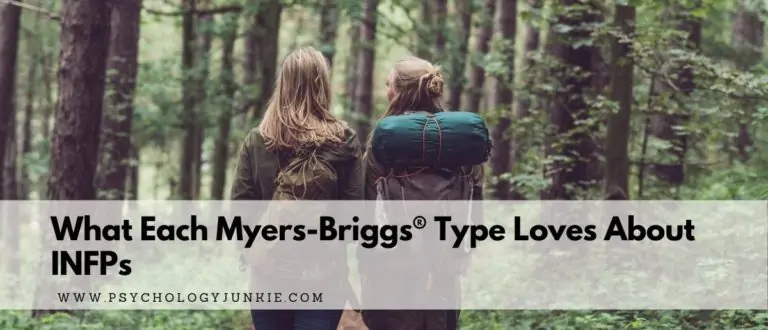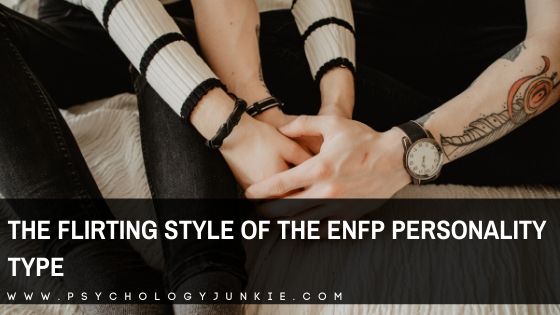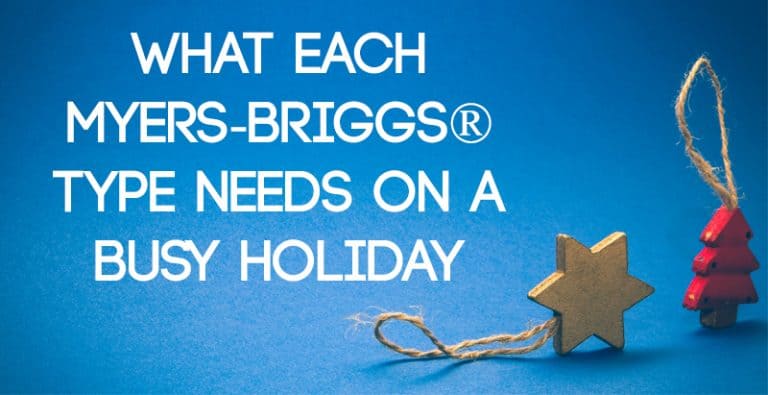5 Signs You Might Not Be an INFJ – And What You Might Be Instead!
Guest Post by Marissa Baker at LikeAnAnchor.com
INFJs are only supposed to be 1-3% of the population, but sometimes it seems like half the people who take online tests end up as INFJs. One reason for all the mistypes has to do with a problem in online tests. Copycat Myers-Briggs tests are notoriously inaccurate because most only look at letter dichotomies (whether you’re an I or an E, a T or an F, etc.) instead of using the cognitive function theory that’s at the heart of Myers-Briggs.

Want to take a personality test? Personality Hacker has the most accurate free online personality indicator I’ve been able to find. Click here to take it. (This is an affiliate link).
Consciously, each type uses four cognitive functions. An INFJ has the following cognitive function stack:
Dominant function: Introverted Intuition (Ni)
Auxiliary function: Extraverted Feeling (Fe)
Tertiary function: Introverted Thinking (Ti)
Inferior Function: Extraverted Sensing (Se)
This tells us that INFJs take in information using Introverted Intuition. That’s their dominant or “hero” process – the one they’re most comfortable using. They make decisions using Extroverted Feeling, which is the auxiliary or “co-pilot” process. INFJs also use tertiary Introverted Thinking and inferior Extraverted Sensing, though these functions are not as well developed.
Find out more about cognitive functions in these articles:
Personality Testing – Fact or Farce? Part Two – Understanding the Cognitive Functions
An Introduction to the Cognitive Functions in Myers-Briggs® Theory
Different types use a different combination of functions. The way a type’s function stack fits together describes how they gather information, make decisions, and generally approach the world. By comparing the function stacks for INFJs with the functions used by look-alike types, we can get a better idea of whether or not INFJ is the best-fit type for you. In this article, we’ll take a took at 5 signs that you might not be an INFJ and then use cognitive functions to suggest types you might be instead.
Sign 1: You’re In-Tune With Your Own Emotions
If you always check in with your own emotions before making a decision and it’s easy for you to process your feelings internally, there’s a good chance that you’re not an INFJ.
INFJs often struggle to deal with their own emotions. This type uses Extroverted Feeling (Fe) when making decisions. Fe is better equipped to handle the emotions of other people than what the INFJ is feeling themselves. When making decisions, INFJs will look at questions like, “What will make other people happy?” and “How can I maintain interpersonal harmony?”
In contrast, types that use Introverted Feeling (Fi) need to honor their own experiences before they start meeting other’s needs. They’ll ask questions like, “Does this feel right to me?” or “Is this decision in-line with my values?” While INFJs do care about being true to themselves, it’s not usually their primary goal when making decisions.
What you might be instead …
INFPs have Fi as their dominant function and they’re also the most common mistype for INFJs. If both Sign 1 and Sign 5 are true for you, then INFP is probably a better fit for you than INFJ.
Find out more in this article: Are You An INFP or an INFJ? Clarifying the Most Common Mistype!
There’s also a chance that you might be an ISFP type since they also use Fi as their dominant function. If Sign 2 in this article also fits you, there’s a good chance ISFP is your best-fit type.
Another possibility is that you’re an INTJ. INTJs share a dominant function, Ni, with INFJs and use Fi as their tertiary process. See Sign 3 in this article for more information about the difference between INFJ and INTJ.
Sign 2: You’re Well-Grounded In The Real World
If you’re perfectly at home with sensory details, have a keen interest in the real world, or quickly lose interest in theoretical discussions there’s a good chance you’re actually a Sensing type.
INFJs lead with a process called Introverted Intuition (Ni). That makes Extroverted Sensing (Se) the least-developed function in an INFJ’s stack. INFJs are perfectly at home with things they can’t directly experience. In fact, they may struggle to stay interested in the real world because the perceptions inside their heads are so much more interesting than what’s going on outside.
Mistaking Sensing for Intuitive types is often caused by online profiles that claim Intuitives are the only ones who can daydream, have creative thoughts, and come up with innovative solutions. However, some of the most deep-thinking, creative, and innovative people I know are Sensors. They just express those traits in a way that’s unique to their personality. For example, I might come up with some creative ideas to solve a problem but so can my ISFJ father and he’s the one more likely to 1) put that solution into practice and 2) have it actually work.
Find out more in my article: Challenging Myths About Sensing Types and Inviting A More Balanced Dialogue In The Myers-Briggs Community
What you might be instead …
It’s pretty easy for ISFJs to mistype as INFJ because the two types share Fe as their co-pilot and Ti as their tertiary process. They can look very similar in how they make decisions, but these types learn information very differently.
ESFJ is another possibility. These types have dominant Fe and they also use Extroverted Intuition as their tertiary function, which they might mistake for an INFJ’s dominant Ni. Check out Sign 4 in this article for another hint that you might be an ESFJ.
If both Sign 1 and 2 resonate with you, then you might be an ISFP.
Sign 3: You Make Decisions Based on Impersonal Logic
If you prioritize factual logic over making sure the people around you stay in harmony, there’s a good chance you’re not an INFJ.
While INFJs can use their tertiary Introverted Thinking (Ti) to make decisions, they’re usually much more comfortable using Fe. INFJs care more about people than about knowledge. That doesn’t mean knowledge, accuracy, and logic aren’t important to INFJs. It just means that those things are less important than considering the human factor.
If that part of an INFJ’s personality doesn’t resonate with you, you might be a type that primarily uses Thinking to make decisions. In this case, you probably identify with aspects of an INFJ’s personality that seem more logical. You might be a type that also uses Ti or you could be an Intuitive that has a good balance between your thinking and feeling sides.
What you might be instead …
INFJ and INTJ share Introverted Intuition as their dominant function. A well-balanced INTJ might not identify with stereotypes that describe them as unfeeling or hyper-logical. Even so, INTJs are more likely than INFJs to share their criticisms with other people, organize their lives for maximum efficiency, and thoroughly plan for the future. See Sign 1 for another trait that might mark you as an INTJ.
There’s also a chance you could be an INTP or ISTP. These types both use Ti (which is an INFJ’s tertiary function) as their dominant function. An INTP will identify with the strongly Intuitive aspects of INFJ descriptions (see Sign 5). ISTPs share all the same functions as INFJs, but use them in a different order: Ti, Se, Ni, Fe (see Sign 2).
Sign 4: You Can’t Go Very Long Without People
If you thrive in groups of people and need to spend quite a bit of time in the “outer world,” there’s a good chance you’re an extroverted type.
INFJs with a strong Fe side might look extroverted at times. And INFJs are social enough that they often start to feel depressed and upset if they don’t see people on a fairly regular basis. But make no mistake – they’re still introverts. INFJs need their alone time and they prefer to interact with people one-on-one or in small groups.
An INFJ might get lonely if they don’t see people for a day or so and want to reach out to a good friend. A similar, but extroverted type, might need some alone time in between socializing but overall they’re happier when surrounded by positive social interactions. Extroverts are also more likely to enjoy public speaking, be comfortable in crowds, and plan on spending time with multiple people at once.
What you might be instead …
ENFJs are the extroverted type most likely to be mistaken for INFJs. These two types share the same functions, but ENFJs lead with Fe and have Ni as their co-pilot.
You should also read-up on ESFJ types, since they also use the Fe function when interacting with the outer world. Take a look at Sign 2 and 5 for other hints that you might be an ESFJ.
Sign 5: You Love To Explore In The Outer World
If you like to take your “what if?” questions into the real world to experiment and explore, then you might find that one of the types using Extroverted Intuition is a better fit for you than INFJ.
There are two different versions of the Intuitive mental process: Introverted Intuition (Ni) and Extroverted Intuition (Ne). INFJs use the introverted one, which loves to speculate and ruminate on things. It’s a very subjective, personal way of perceiving the world that spends a lot of time looking inside your own mind.
Extroverted Intuition, on the other hand, goes to the outer world in order to explore patterns and find inspiration. It’s going to be asking similar types of questions as Ni, but Ne is more focused on going out and experiment with their ideas. Someone with this type as their hero or co-pilot process can’t resist the urge to open closed doors, push buttons, and say things just to see how people will respond.
What you might be instead …
INFP is the type most commonly mistaken for INFJ, and they use Ne as their co-pilot process. If Signs 1 and 5 are both sound true for you there’s a very good chance you’re an INFP.
ENFPs lead with Ne and have Fi as their co-pilot. If Signs 1, 4 and 5 are true for you there’s a good chance you’re an ENFP.
ENTP and INTP types also use Ne. In addition, they have Ti and Fe in their function stack, which might make them relate to certain aspects of INFJ type descriptions.
In Conclusion…
I hope this article helps you understand the differences between INFJ and the different look-alike personality types. I also hope it helps you to figure out which type is the best-fit for your personality. Let me know what you think of this article and if you have any other suggestions for finding your best-fit Myers-Briggs. See you in the comments!
Marissa Baker is the author of The INFJ Handbook (available in the Amazon Kindle Store). You can find her online at LikeAnAnchor.com where she blogs about personal growth and development from a Christian perspective.










As someone who has never been able to figure out if I’m an F, T, P or J ( I’m all pretty evenly) but is usually is pegged as an INFP, this was eye opening to me. I know you meant it to convince people they are not INFJ, but it convinced me that I am. I will do more research into the function stacks to be sure. This was very helpful!
At this point I’m thoroughly confused . I’m sure this article makes sense to someone who understands all these typology terms but but for someone trying to figure it all out it’s just confusing. Thank you for the article.
What I can’t find… and what I think would be helpful… is a list of the typology terms distilled to just one definitive sentence each in plain English. Simple English.
I’m so glad you wrote this article!
The very first personality test I took resulted in INFJ-T, and I had no idea what it meant. I’ve taken several different tests since then that have resulted in INFJ, INTJ, INFP and INTP. Reading this I’m convinced I do not use Fi well at all, so the result of INFP or INTP is inaccurate. Now I’m having difficulty now comprehending if I’m an analytical INFJ, or an emotional INTJ. I seem to have an equal balance between my Ti and Fe functions, so does that make me an INTFJ? Seriously though, how can I identify which of the two is more appropriate for my personality?
I always get the result of intj or infj as well sometimes with only a 2% difference
Great article! I mistyped as an infj for years and finally started studying the functions and reading personality descriptions of other types because although much of the infj description fit me, it didn’t encompass all of me (like my interests in architecture and engineering). Finally realized that I am actually an ENTP.
I think one of the reasons I mistyped was because of stress and trauma throughout childhood. I’m pretty sure that my type under stress starts to function in ways that look very INFJ. For instance, my tertiary function, Fe, becomes more predominant than usual, I withdraw from people, and I keep my dominant Ne inside myself/don’t act on it because of anxiety. Hence I end up looking like an introverted Ni Fe user. Obviously mistyped ENTPs can’t account for all the extra INFJs out there, since we also comprise only a small percentage of the population, but it makes me wonder if perhaps there are other types that also look like INFJs under stress– in some ways it seems like a normal human thing to become more withdrawn and/or overlt attentive to the feelings and expectations of others under certain kinds of stress. The difference is that an INFJ in such a state is thriving and living out these things in a positive manner, whereas the ENTP or similar is not. One piece of advice I have heard for testing whether you are a certain type is to try and live as that type for a while. Do the things they are advised to do, etc. If it doesnt make you happy but make you feel confined, you are prob
Very well written. I used to wonder if I was INFP or ISFJ, but once I discovered cognitive functions I realized I can’t be anything but an INFJ. This only confirms that. I hope it will help people who are mistyped so they can use MBTI the way it’s meant to be–for personal growth.
Great article!
Ok, I will try to clarify what I think about my opinion.
.Intuition is subjective by definition. Extraverted or introverted.
.The impersonal logic is related to Si and not Te. If refers to past experiences, its own first, but also those of others by logical extension. For example, Te / Se is not impersonal. Since he works with a dominant intuition which is personal. Extroverted thinking is a strong desire to communicate his sense of organization and logic. In writing, or orally. Nothing more.
If I’m wrong, please explain the reason
Te is by definition impersonal. But it is not necessarily a impersonal logic.
This made me more sure that I really am an INFJ, thanks 🙂
Glad it helped!! 🙂
Every question you ask I feel I am the opposite of, so I guess that confirms I really am INFJ?
Every test I do says I’m INFJ, but I can’t bring myself to think that I am part of that exclusive group, I just seem too ordinary. Am fascinated by MBTI, but wish I was confident of who I am?! perhaps that’s typical of my type, waffle, waffle. Thanks for great insightful posts like this, gets me a few steps further towards discovering the answers.
Oh my gosh. I feel the same! Am I really an INFJ? Everybody talks kind of angry about people claiming to be an INFJ when there are not. They say lots of people want to belong to this group. So can it be true that I fit? Thank you for sharing youre thoghts. It really helped me. I thought I was alone.
Best wishes!
I don’t feel that I’m part of the exclusive INFJ, but like you, after taking the professional test and two online tests, I keep coming up with INFJ. I don’t think I’m exactly like every other infj.
Three years later I know I’m an infj. I don’t think it’s an easy task. There’s so much material about this personality that it can be confusing. One online test won’t certify your personality in my opinion.
I am an INFJ (though with a better developed than usual analytical side) surrounded by ENFPs, INFPs, INTJ’s, and even a stray ENTJ and I can tell you that the descriptions you provide of how the various functions manifest in cognitive stacks for those types is spot on in this article. Thank you for providing such clear and concise information!
What do you make of someone who only identifies with sign #1? Everything else doesn’t fit for me, and pretty much everything about the drivers for INFJ fit for me except the part where I can’t understand my own feelings and reactions… could that have anything to do with the fact that personality traits in general seem to be on a continuum rather than in clearly separated categories? Just curious.
Hi there. I can relate to sign #1 as well. I have tested INFJ on both official MBTI assessment and Keirsey temperament sorter. On Keirsey I had the maximum score for all 4 dichotomies. For the MBTI assessment it was the same like Keirsey, except for Feeling (for which I had a clear instead of very clear preference ). I think that in general I can be considered to be compassionate and altruistic. Sometimes I can be intolerant and demanding, though. I do not like people who are messy. I have a very strong dislike for people who throw garbage on the street, for example. It really annoys me. Sometimes I can become bitter or even aggressive when people do not follow my standards. I highly value knowledge and intelligence. I am very argumentative at times as well. Then my patience with irrational arguments is very low. I am an Enneagram 4w5 with a strong 1 influence. Does this mean I am mistyped?
Thanks for the insightful article. I am quite sure I am an INFJ, though. After doing both the official MBTI assessment and Keirsey temperament sorter, the results were very clearly INFJ. The only other option I consider is INTJ, but I think I am not.
yall really pretending to act this professional
Am i an INFJ if the only thing is i like to explore other countries… But every test i do tells me im an INFJ. Nothing else fits me.
Thank you so much for the knowledge! Honestly, I am content with the new knowledge I am gaining from all these articles and I am almost able to form my own theories for my own satisfaction. My mind is the best place in the world for me but I still need to see someone every once in a while. I love keeping people in harmony even if I discovered a rule has been broken. Lately I feel lost and that’a why I took into these personality tests; I have been acting out of my comfort zone leading me to avoid my social hangout. I was fine when it was one or two people but now, now my reputation stands strong and I have been hiding from everyone. It’s weird balancing my core values and harmony but in the end, I choose the smile upon everyone’s souls over my core values. It’s just truly astonishing!!! So far each part of knowledge I study happens to match the INFJ trait I seem to test positive for from questionaires/surveys and studied knowledge. Let me know if there are any books that you think will satisfy me! I love to develop theories from facts/opinions and talk with my friends (even if they are unresponsive to the amount of details I would like) because they understand and always respond! One more request, are there any good clothing websites out there? I just love, love, love to encourage fashion! It’s a huge spoken word to my soul when you represent yourself in fashion, writing, and so much more!
Awareness of my own emotions, the first sign I might not be an INFJ. I disagree with this. INFJ’s are the healers/counselors. I’ve had to work through a lot of painful issues in my life whicheans I’ve had to become more aware of my emotions in order to begin/continue the healing process.
I love helping others but I can’t to that when unhealthy emotions are controlling my life. Anger and stress kept me trapped in an Ti-Si loop that I wouldn’t have been able to get free of without that self awareness.
The other four aren’t me at all.
So this confirms it. At first, I thought “Nah it can’t be I can’t be INFJ” so I kept on taking the same tests for years since one’s answers supposedly might change therefore you gotta take the test several times to make sure… or so I heard. Now I see this, another thing confirming once more that I am one. Not sure if it’s a good or bad thing though.
I studied mbti theory for 5 years to figure out my type but through this article it became much clearer that I am INFJ.
It took me long enough for I don’t exactly know who I am or what I feel (which you said in the article) and that’s the reason for mbti spiral for years lol.
But thanks to this article, I don’t have to question my mbti anymore.